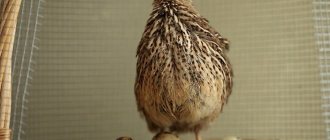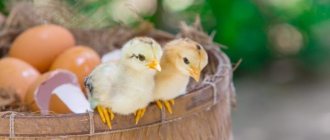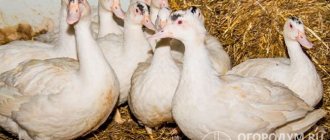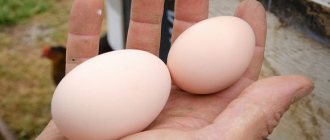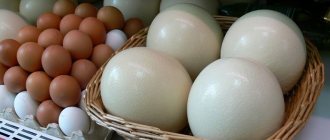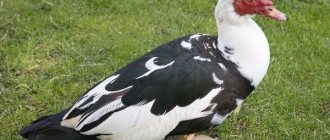Despite the fact that ducks are bred for meat, poultry farmers need to know when ducks start laying eggs and how many eggs each female can lay. This information is important for calculating the number of parent stock to produce young animals. Egg production rates differ among different breeds; in addition, the number is influenced by the conditions and age of the bird.
When do ducks start laying eggs at home?
Many novice poultry farmers are primarily interested in the age at which ducks begin to lay eggs. How many months the female lays her first egg depends on factors such as nutrition, care, living conditions, and individual characteristics of the body.
On average, this is usually around 6 months old. These poultry usually begin laying eggs in the spring. In the 2nd and 3rd months of laying, the number of eggs increases to 23–26 eggs per month, in the 5th and 6th months - up to 27.
These domestic birds are capable of laying eggs all year round. The only exception is the molting period, which occurs 2 times a year:
- in the summer (June - July), when the tail feathers fall out, then small ones, and the flight feathers are renewed;
- in the fall (September - October), when only the tail feathers and small feathers are renewed.
During molting, it is important to provide birds with special care, since during this period they are most prone to diseases.
Duck egg production
Compared to other poultry, ducks are long-lived birds as they can live for about 20 years. However, they lose the ability to lay eggs by the age of 5–6 years. On average, each female can lay about 120 eggs per year.
The egg production of these birds is influenced by the following factors:
- care of the owners for birds;
- breed;
- balanced diet;
- age of birds.
Important! Ducks typically lay eggs between 2 and 3 am. To obtain chicks, it is necessary to collect eggs no later than 6 am in order to prevent them from hypothermia, which will make it impossible for the ducklings to be born.
At 6–8 months
As already stated, ducks begin laying eggs at about 6 months of age. When females reach this age, egg laying begins almost daily, and in the first month the pullets lay 20 eggs. In the 2nd and 3rd months (at the age of 7–8 months), the number of eggs will increase to 23–26 eggs per month.
At 8–10 months
From the beginning of egg production and further to 3 years, the productivity of ducks only increases if they are kept in suitable conditions. Therefore, at 8–10 months of age, females lay even more eggs than from the beginning of oviposition - up to 27 eggs per month.
At 10–12 months and older
The most productive, as practice shows, is the 2nd year of egg laying. It is during this period that the eggs are of the highest quality and the chicks from them are born healthy; moreover, they grow and develop faster.
Subsequently, the egg production rate decreases by 5–10% every year and drops significantly by 5 years.
Features of egg production in winter
Under natural conditions, the most productive egg-laying period for ducks is spring, when weather conditions contribute to this, the opportunity to obtain all the necessary nutrients from food, etc.
However, when raising such birds at home, you can try to provide them with comfortable conditions for egg laying even in winter. To do this, it is necessary to maintain a temperature in the duck house of at least 8 °C.
During the day, females can spend time outside in places cleared of snow, but at night they must spend the night in a room specially equipped for this with a certain temperature.
If the temperature is below the specified value, the eggs will freeze, and in the worst case, the ducks may stop laying eggs altogether.
Important! When the air temperature is too high, the birds feel worse and they may also stop laying eggs at their normal pace. Therefore, it is necessary to carefully monitor the microclimate so that the livestock is not too cold or too hot.
Also, the poultry house must have bedding about 30 cm thick; they can be made from straw, shavings, etc.
Take care to keep the duck house not only warm, but also dry, be sure to keep the duck house clean, and regularly ventilate the room where the birds live.
Egg production also directly depends on the length of daylight hours. Thanks to sunlight, the birds' bodies produce red blood cells, vitamin D, and the level of hemoglobin increases, therefore, the productivity of ducks increases.
If you want to ensure that the egg production of poultry does not decrease in winter, provide them with additional artificial lighting.
Stressful situations
If the poultry yard is inhabited by birds of different breeds, several drakes or individuals of different ages, conflicts between them are possible. Most often, in fights, males defend their territory or measure their strength in order to win the favor of the female. There are frequent cases when young birds attack an old individual or adult birds attack babies.
Fights lead to more than just physical injuries. They provoke stress even in birds that do not take part in the conflict. In an unfavorable psychological environment, ducks, feeling anxious, will not lay eggs.
This reason can be eliminated by placing the birds in separate rooms and organizing their walking at different times. It is important to isolate the laying hens from other birds and provide them with complete rest.
Influence of breed on egg production
The productivity of these birds also depends on their breed.
Let's find out what breed of ducks you need to choose to get the most eggs:
Beijing
Most often, poultry farmers choose the Peking breed for breeding, the meat of which, however, is distinguished by its fat content. Beijing females in adulthood gain about 3 kg of weight, and their egg production reaches 150 eggs per year.
If you properly care for the livestock and eggs, you can get 100 ducklings in a year. They usually lay eggs at night, but they are bad parents and do not like to hatch eggs.
Indian
Indo-ducks, or, as they are also called, musk ducks, are purchased by lovers of leaner meat. Representatives of this breed are distinguished by their calmness.
Such birds grow quite large, and egg production is about 120 eggs per year. If Peking ducks lay eggs at night, then musky ducks are still sleeping at this time, and begin to lay eggs closer to the morning.
Mulard
To improve the quality of meat, some poultry farmers cross representatives of the two previous breeds to produce Mulard ducklings.
They grow very quickly, reach quite large sizes, but begin to lay eggs only after reaching 180 days of age. The egg production of mulards is about 100 eggs per year.
Using eggs
Like chicken, Muscovy duck eggs are widely used.
In cooking
Many culinary recipes call for the use of Muscovy duck eggs. Some housewives even prefer them to chicken ones, but it is difficult to buy eggs in stores; they are purchased from private households or on farms.
Stores sell duck egg mayonnaise, which has a high calorie content and excellent taste.
Cosmetics
Folk cosmetic recipes have long recognized the benefits of duck eggs; their rich composition and increased amount of fat help improve the condition of weak, breaking and falling hair. An effective nourishing mask is obtained when the yolks are mixed with olive oil; after several procedures, the effect will be amazing. When rubbed into the scalp, yolks mixed with yogurt help with hair loss.
Protein is used to make masks for oily skin; soon the pores will shrink and wrinkles will smooth out. The yolk is suitable for oily skin, it becomes soft and smooth.
It is profitable to keep indo-ducks at home; the benefits of eggs are undeniable, which is why they are becoming more and more popular. Good living conditions and high-quality food will help Muscovy ducks to actively reproduce, which will provide the family with tasty meat and nutritious eggs.
The post What You Need to Know About Indo-Duck Eggs appeared first on SeloMoe.
The main conditions of detention for ducks to start laying eggs
Ducks begin to lay eggs at 5-6 months if they are kept according to the rules. Egg production increases when the required temperature is maintained in the room.
Productivity is influenced by nutritional adjustments and daylight hours. The breed also influences the age at which Indian ducks begin to lay eggs.
Complete and constant feeding
25-30 days before the bird begins to lay its first eggs, it needs frequent, nutritious meals. At this time, a feeding regimen is established at least 4 times a day.
Various nutritional elements and vitamins help the egg to form; for this purpose, the food is balanced.
Boiled meat, fish, whey, low-fat cottage cheese and products containing animal fats will help the little duckling get stronger, grow, and gain weight.
Increased daylight hours
Domestic ducks will be able to lay their first clutch ahead of schedule if additional lighting is installed in the room.
The development of reproductive organs in birds is directly related to light, therefore, before laying begins, the daylight hours are gradually increased to 15-16 hours, adding 25-30 minutes daily.
Light bulbs with a power of 700 lm are hung evenly around the perimeter of the poultry house (1 light bulb per 1 m²). At night, one dim lamp is left on and the rest of the lighting is turned off.
Walking mode
Daily bird walking should take 40-45 minutes. This is important when ducks begin to lay eggs.
Also, walks include water treatments, so there should be a small pond near the poultry house.
Stimulation of laying hens
If the farm follows all the recommendations for keeping poultry, but domestic ducks refuse to lay eggs, stimulation can be carried out. It consists of giving the livestock biologically active additives that stimulate the body and increase tone. Such drugs can be purchased at veterinary pharmacies and given to the bird according to instructions, remembering that an overdose can lead to deterioration in health.
The most popular means:
- Aqueous infusion of Eleutherococcus roots. The drug begins to be given 3 weeks before the start of egg laying. Dosage - 0.3 g of dry matter per head per day. The dietary supplement is introduced into the feed for 20 days.
- ASD. Dorogov's stimulant has a strengthening and mobilizing effect on the animal's body. Ducks are given the drug in an amount of 3 ml per 100 heads. For ease of use, the working volume of the liquid is first diluted in water, then the solution is added to the feed. The course of stimulation is 1 week.
- Premix or BMVD. The complex of vitamins and minerals has a stimulating effect on the bird, accelerating the onset of egg laying. For ducks, the same premixes are used as for chickens: Zdravur Laying, Ryabushka.
It is necessary to understand that artificial stimulation of the bird forces the body to work to the limit of its capabilities. Without the support of a balanced diet during egg laying, the duck will weaken and may die.
Reasons for the decline
The egg production of ducks may decrease significantly, or birds may stop laying eggs altogether for the following common reasons:
- Unsuitable temperature conditions: birds in the nesting house must feel safe; for this, the temperature of the room where they live must be at least 8 ° C, otherwise egg laying may not be possible.
- Unbalanced nutrition: it is important to provide the ducks with the necessary amount of food and clean drinking water, but not to overfeed the livestock (obese females do not lay eggs). When breeding ducks, it is better to use grain and special mixtures that include grass, bone meal, etc. If you want the birds to be healthy, choose high quality food.
- Lack of fresh air. Even in winter, these birds need walks. They may not be as long as at other times of the year, but they are necessary every day for at least 1 hour.
- Short daylight hours. To ensure that the egg production of ducks does not decrease during the cold season, it is necessary to equip the duckling house with artificial light.
If you eliminate all of the above reasons for a decrease in egg production, then only health problems can interfere with the birds’ good productivity. In this case, it is better to contact a veterinarian to help determine the cause of the problem.
How to increase?
To increase the productivity of poultry, you need to:
- Monitor the health of both laying hens and drakes. An indicator of their health is the bright orange color of their legs and beak, as well as a good appetite. If your ducks are not drinking or eating enough, you should contact your veterinarian.
- Along with regular food (which should include tops of root crops, potato peelings, soaked barley, greens), use various vitamin supplements for large birds.
- These birds are very sensitive to relocation, which is stressful for them. Therefore, to prevent ducks’ egg production from decreasing, it is better to save them from “moving.”
- Most breeds of domestic ducks cannot live peacefully with members of another breed. Therefore, in order to avoid conflicts between individuals, which are also stressful for them and can reduce the level of egg production, it is better not to keep representatives of different breeds in one place.
Preparing for egg laying
Most domestic ducks are unpretentious to the conditions in which they live. All they need is:
- warm and ventilated chicken coop;
- good nutrition;
- without external irritants.
On the eve of hatching, females carefully arrange their nests. To make it easier for them, it is better for the owner to install special boxes in the barn.
While ducks are laying eggs, they should not be moved to another house. It is better to plan the construction of a chicken coop, as well as the move, for autumn or winter, so that the birds get used to their new home by spring.
Nests lined with hay or sawdust should be placed in the far corners of the barn, where there is no bright light, dry, warm and quiet. As bedding becomes dirty, it should be replaced.
Hatching Issues
When ducks begin to lay eggs, comfortable, calm conditions are created for them to hatch:
- A drinking bowl with clean water is placed next to the nest. While hatching chicks, the bird should eat well and drink a lot.
- For musky breeds, a large trough with water for bathing is installed in the room.
- When the hen sits on the clutch, the water remaining on the feathers washes away the fatty film from the eggs, enriching them with oxygen. Also, water from the feathers prevents the eggs from overheating.
- The first few days the laying hen does not get up from the nest and does not eat. Then every day he goes for a thirty-minute walk. This helps her feel better.
Preparing eggs for laying
Before lining the eggs in the nest, they must be kept in a dark, dry place for 5 days. The temperature in the room should be +15 ... +20 °C.
Poultry farmers advise washing the eggs before laying them, but such treatment is not necessary; the chick will hatch without it.
How to train an Indian duck to sit on eggs?
To develop the maternal instinct in a bird, 20 eggs are laid in a nest. It will not be possible to assemble a large batch right away, since the first eggs may disappear. Therefore, the hen is taken home, the eggs are accumulated to the required quantity, and then they are added.
Farmer tips:
- To sort out defective eggs (dirty, cracked, irregularly shaped), the first batch is taken away and eggs from another clutch are placed in its place.
- The first clutch is taken home and marked.
- The duck will get used to the nest faster if she is given a false egg. When the hen gets used to it, she is given eggs from the first clutch, and then all the others.
- The lining is carried out so that the bird does not see it, otherwise it will refuse the eggs. This is done when the hen goes for a walk. To ensure that the temperature of the clutch is at the required level, eggs that do not fit under the bird are removed.
Benefits and harms
Is it possible to eat Muscovy duck eggs? Many people love them; their taste is almost no different from the usual chicken ones, although they have a slight peculiar taste and smell. The rich composition of eggs can benefit the human body:
- Vitamins B6 and B12 have a beneficial effect on the nervous system and improve blood composition.
- A, E - help strengthen the immune system.
- Vitamin D is necessary for the absorption of calcium.
- Magnesium and potassium will ensure smooth functioning of the myocardium.
- Calcium, phosphorus, selenium - brings health to teeth, bones, hair and nails.
- Folic acid – good blood circulation, active brain activity.
- Proteins are a building material for muscles; for those who go to the gym or suffer from low weight, nutritionists recommend periodically including duck eggs in their diet.
This suggests a conclusion: it is possible to eat musk duck eggs, and in special cases it is even useful. In some countries they are considered a delicacy and original dishes are prepared from them. For example, in the Philippines people eat them when the embryo is already formed.
Turkey eggs can be eaten, but they have a specific taste
Not everyone here dares to try eggs. Why? The unique taste and aroma do not allow them to be eaten recklessly. But when they are used as part of other dishes, the difference becomes completely unnoticeable. We traditionally put them in salads and add them to cold soups. Fats give the protein viscosity and oiliness, which makes the butter dough airy and soft, and noodles cooked with eggs are extremely tasty.
So the benefits are obvious, can they cause harm?
- The shell contains a lot of bacteria that can provoke the development of various intestinal infections, including salmonellosis. To prevent this from happening, you need to wash it well before using it, and boil the egg for a long time, at least 30 minutes.
- It is strictly forbidden to eat raw eggs; the likelihood of getting sick is very high.
- This product is heavy, so it is not advisable to feed it to small children; it can harm their stomach.
- It contains a large amount of fats; for people with increased weight, it is better to eat them in limited quantities.
- Harm may occur to people who are allergic to this product.
Eggs can be stored for consumption at home for 30 days. If you prepare them correctly and eat them in moderation, then there will be no harm from them, and the benefits will be priceless.
Turkey eggs can be stored for up to 1 month
Other recommendations
In order for ducks to produce more eggs and not stop laying eggs, experienced poultry farmers advise the following:
- During the productive period, you should not suddenly change the diet of the female or relocate her. This will cause stress, which may delay the onset of laying or reduce the number of eggs.
- You can determine that white ducks are ready to lay eggs by the changed color of their beaks and paws. They turn bright orange.
- Birds finish flying early in the morning. If you plan to hatch ducklings, in the cold season it is better to collect eggs at 5–6 o’clock in the morning. This will prevent hypothermia.
- It is recommended to change the nest litter daily to prevent the eggs from becoming too dirty.
- Do not be alarmed if the duck stops laying eggs during the molting period. This is a natural stage of feather change. After its completion, egg laying will begin again.
- Heat negatively affects bird productivity. They should have the opportunity to cool down - a pond in the paddock, a large container of water in the pen.
- Females need walks. Lack of movement leads to oviduct pathologies.
What are turkey eggs?
The egg of a musk duck, also called an indo-duck, is a little larger than a chicken egg, its weight is usually about 65-75 g. The shell is thick and strong, their color is not pure white, it has a shade of baked milk. The shape of the egg is slightly elongated and slightly pointed at one end. The yolk is large, bright orange, this is due to the large amount of carotene. The nutritional value of the product is presented in the table.
| Chemical composition | Kcal 100 g | Fat % | Proteins % | Carbohydrates % | Carotenoids % |
| Egg | 190-205 | 14-15 | 52-54 | 1,0-1,3 | 18-20 |

